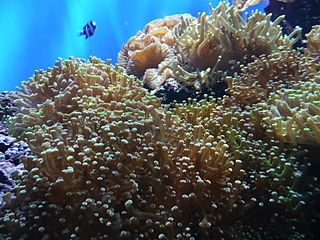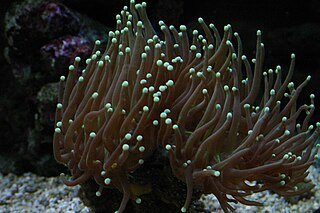Related Research Articles

Euphyllia divisa, commonly known as frogspawn coral and sometimes misspelled Euphyllia divisia, is a large-polyped stony coral native to the Indo-Pacific islands. It is a commonly kept species in the marine aquarium hobby. The related coral Fimbriaphyllia paradivisa is frequently misidentified as frogspawn leading to some confusion. Fimbriaphyllia divisa has a corallite skeleton with a flabello-meandroid "wall" structure whereas Fimbriaphyllia paradivisa has a tree-like branching structure with separate coralites.

Euphyllia is a genus of large-polyped stony coral. Several species are commonly found in marine aquariums. The genus includes the following species:

Euphyllia ancora is a species of hard coral in the family Caryophylliidae. It is known by several common names, including anchor coral and hammer coral, or less frequently as sausage coral, ridge coral, or bubble honeycomb coral.

Euphyllia cristata is commonly called grape coral. E. cristata is a kind of stony or hard coral in the family Euphylliidae; it also belongs to the genus Euphyllia in the order of Scleractinia. E. cristata has a wide range of distribution throughout the tropical waters of the Indo-West Pacific area with a large presence in Indonesia. However, despite this large range of distribution, E. cristata has a slightly lower abundance compared to other species, making them a little more uncommon to find. They are typically found in shallow waters from 1–35 meters deep.

Euphyllia paradivisa, or branching frogspawn coral, is a species of large-polyped stony coral belonging to the Euphylliidae family. It shares the common name of "frogspawn coral" with Euphyllia divisa, but is differentiated as the "branching" frogspawn whereas Euphyllia divisa has a "wall" structure. It is a commonly kept species in the marine aquarium hobby.

Euphyllia glabrescens is a species of large-polyped stony coral belonging to the family Caryophylliidae. Its common name is the torch coral due to its long sweeper tentacles tipped with potent cnidocytes. It is a commonly kept species in the marine aquarium hobby, particularly specimens from Indonesia and Fiji, who fulfilled annual export quotas of 28,000 and 6,000 pieces, respectively, in 2005.
Euphyllia paraglabrescens is a species of large-polyped stony coral belonging to the Euphylliidae family. The International Union for Conservation of Nature has listed it as a vulnerable species, stating "its threat susceptibility increases the likelihood of being lost within one generation."
Euphyllia baliensis, commonly known as bubble coral, is a species of large-polyped stony coral belonging to the family Euphylliidae.
Amorphus coralli is a Gram-negative, halotolerant, heterotrophic and non-motile bacteria from the genus of Amorphus which has been isolated from the Fungia granulosa from the Red Sea in Israel.
Thalassotalea is an aerobic and chemo-organo-heterotrophic genus of bacteria from the family Colwelliaceae which occur in the ocean and in sea ice.
Thalassotalea agariperforans is a Gram-negative, agarolytic and motile bacterium from the genus of Thalassotalea which has been isolated from the South Sea near the Geoje Island in Korea.
Thalassotalea euphylliae is a Gram-negative, aerobic, rod-shaped and motile bacterium from the genus of Thalassotalea with a single polar flagellum which has been isolated from the coral Euphyllia glabrescens.
Thalassotalea eurytherma is a Gram-negative, aerobic and rod-shaped bacterium from the genus of Thalassotalea which has been isolated from seawater from the East China Sea.
Thalassotalea litorea is a bacterium from the genus of Thalassotalea which has been isolated from seashore sand from the South Sea in Korea.
Thalassotalea loyana is a bacterium from the genus of Thalassotalea. Thalassomonas loyana can cause white plague disease in the coral Favia favus.
Thalassotalea montiporae is a Gram-negative, rod-shaped, aerobic and motile bacterium from the genus of Thalassotalea with a single polar flagellum which has been isolated from the coral Montipora aequituberculata from the coast of Taiwan.
Thalassotalea ponticola is a Gram-negative and aerobic bacterium from the genus of Thalassotalea which has been isolated from seawater from the Geoje Island in Korea.
Marinobacterium coralli is a Gram-negative and aerobic bacterium from the genus of Marinobacterium which has been isolated from the mucus of the coral Mussismilia hispida from the São Sebastião Channel in Brazil. S.I. Paul et al. (2021) isolated, characterized and identified Marinobacterium coralli from marine sponges of the Saint Martin's Island Area of the Bay of Bengal, Bangladesh.
Endozoicomonas acroporae is a Gram-negative, rod-shaped, aerobic and non-motile bacterium from the genus of Endozoicomonas which has been isolated from the coral Acropora.
Thalassotalea profundi is a Gram-negative, rod-shaped and motile bacterium from the genus of Thalassotalea which has been isolated from a scleractinian coral from the Yap seamounts from the Pacific Ocean.
References
- 1 2 "Thalassotalea". LPSN .
- 1 2 "Thalassotalea coralli". www.uniprot.org.
- ↑ Sheu, DS; Sheu, SY; Xie, PB; Tang, SL; Chen, WM (January 2018). "Thalassotalea coralli sp. nov., isolated from the torch coral Euphyllia glabrescens". International Journal of Systematic and Evolutionary Microbiology. 68 (1): 185–191. doi: 10.1099/ijsem.0.002478 . PMID 29143729.